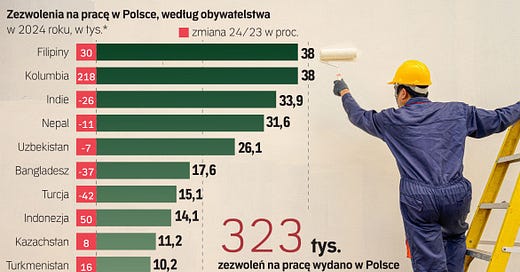Filipinos and Colombians surpass south Asians as Poland’s most in-demand foreign workers
Poland’s labour market is shifting as employers turn to Asia and Latin America to fill workforce gaps in logistics, construction, and food processing after visa scandal tightened controls.
Poland’s economy keeps growing, and so does its demand for foreign workers. Last year’s visa scandal may have tightened controls, but it didn’t stop migration. It just changed where workers are coming from. For the first time, Filipinos and Colombians received more work permits than South Asians, marking a major shift in Poland’s labour market.
A new report from Rzeczpospolita, based on Ministry of Family, Labour, and Social Policy data, shows that despite tougher rules, nearly 323,000 work permits were issued to non-EU nationals in 2024, slightly more than in 2023.
With Ukrainian workers harder to recruit and more expensive, businesses are turning to Asia and Latin America to fill jobs in logistics, food processing, and construction. This isn’t a temporary fix, it’s a long-term trend. The question now is whether government policy will adapt to this new reality or make life harder for employers.
Poland’s reliance on foreign workers comes down to two simple facts. First, the country’s working-age population is shrinking fast, by over 100,000 people a year. Second, Ukrainians, once the backbone of Poland’s migrant workforce, aren’t as available as they used to be. With wages rising and better jobs in Western Europe, fewer Ukrainians are taking low-paid positions in Poland. Employers have no choice but to look further afield.
That’s why Poland’s labour market is changing. The days of relying mainly on European migration are fading. More and more, businesses are recruiting from Asia and Latin America to keep up with demand.
For years, Indian and Nepali workers made up the bulk of Poland’s non-European workforce. Not anymore. In 2024, Filipinos and Colombians took the top spots. The Rzeczpospolita report shows that Filipinos received 38,000 permits, a 30% jump from the previous year—while permits for Colombians tripled. Indonesians also saw a 50% increase, showing just how much Poland’s recruitment strategy is shifting.
Why the change? Industries like food processing, logistics, construction, and hospitality desperately need workers. Many of these jobs, like meat processing or heavy warehouse work, are tough, physically demanding, and low-paid. They’re jobs that Poles and even many Ukrainians don’t want anymore.
Recruitment agencies have taken note. They’ve ramped up hiring from Asia and Latin America, bringing in workers who are more willing to take on these roles. Employers also have their preferences. Colombians are often valued for their physical endurance, while Filipinos have a strong reputation for reliability and adaptability, both qualities that businesses see as essential in hard-to-fill jobs.
All of this is happening against the backdrop of Poland’s 2023 visa scandal. When it broke, the government cracked down on fraudulent work visas, particularly those issued in South Asia and Africa. That meant fewer permits for Indian, Nepali, and Bangladeshi workers.
At first, it looked like the scandal would disrupt Poland’s labour supply. But demand for workers didn’t disappear, it just shifted. Instead of reducing migration, the visa scandal reshaped it, pushing businesses to recruit from different regions.
Politically, the scandal also hardened attitudes toward migration, leading to stricter government oversight. But at the same time, there’s been no real effort to cut back on economic migration itself. The Polish economy simply can’t afford to do without foreign labour.
Even as demand for non-European workers grows, hiring them is still a bureaucratic nightmare. The process is slow, expensive, and full of red tape. Many businesses can’t get work permits fast enough, which makes filling urgent vacancies even harder.
And there’s uncertainty ahead. The Polish government is reviewing migration policies, with some proposed changes that could tighten employer obligations. Business groups are worried: if the rules get too strict, companies might turn to informal hiring, increasing the risk of exploitation and unfair competition.
Cultural differences can also be a challenge. Many businesses aren’t used to integrating non-European workers, especially in jobs where language barriers and different work habits could slow things down. But despite these difficulties, the recruitment drive continues, because, at the end of the day, Poland’s workforce shortage isn’t going away.






I think most people from Ukraine and Belarus don't need to apply for that type of work visa, not sure about Moldova
An important point about Filipino's, they are Catholic and highly devout. That goes down very well here. Filippo's have been coming to Ireland for 30 years, many work as assistants in hospitals and get along very well with elderly patients.